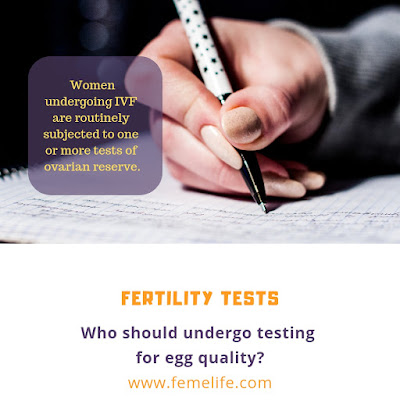How important is testing for Eggs?
Women undergoing IVF
treatment are often advised for tests of ovarian reserve. The results of these
tests are used to counsel women regarding success of fertility treatment. If
you are desperate in attempting for pregnancy or planning to delay childbearing
then should always test your ovarian reserve.
What is ovarian
reserve testing?
Ovarian reserve is a term used to describe the functional
potential of the ovary and reflects the number and quality of oocytes within
it. Such a test helps you to know your reproductive potential and plan a
pregnancy accordingly. Reproductive potential can be affected due to conditions
such as treatment for cancer, endometriosis or pelvic surgeries.
Why ovarian reserve testing done?
In women attending for fertility treatment, a test of
ovarian reserve guides in outcome of fertility treatment. It can predict the
chances of pregnancy with or without treatment. It also helps deciding an
optimal dose of fertility medications where treatment using ovarian stimulation
is planned.
What are the tests for ovarian reserve?
FSH (Follicle stimulating hormone), AMH (Anti-Mullerian
hormone), inhibin-B, estradiol, AFC (antral follicle count), ovarian volume,
CCCT (clomiphene citrate challenge test), GAST ( GnRH agonist stimulation test),
EFFORT (exogenous FSH ovarian reserve test) and ovarian biopsy are the
exclusive tests for ovarian reserve.
Why testing for ovarian reserve is important?
Ovarian reserve tests predict potential of the ovary
and reflects the number and quality of oocytes within it. It is important if
you are attempting for childbearing.
Why
ovarian reserve testing is done in cancer patients?
Ovarian reserve tests help women concerned about the
loss of reproductive potential due to treatment for cancer. Various cancer
therapies like radiation or cancer drugs are toxic to the ovaries and can kill
the egg cells.
What are the tests for ovarian reserve?
Ovarian reserve tests include basal hormone analysis
and ultrasound assessment of ovaries. Hormones like FSH, LH hormone, AMH, inhibin-B, estradiol indicate the
fertility potential of women. Ovarian ultrasound tells about the volume of
ovaries and hence fertility reserve.



Comments
Post a Comment